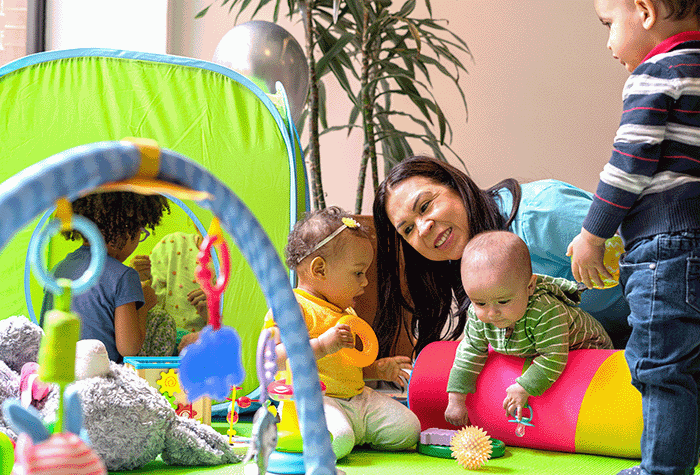Posted: September 26, 2024
Anyone who works in the early childhood space encounters days that are thoroughly exhausting or rewarding—and probably many days that are both! When you are feeling worn down or burnt out it can be extremely beneficial to remind yourself just how important your work is.

Child care worker on the floor interacting with several infants and young toddlers.
Even if it seems like there are times when what you do goes unnoticed by parents, the community, or society in general, your role as an early childhood educator plays an absolutely critical role in promoting healthy child development to set children up to be happy, healthy, successful individuals in both the immediate and distant future. Below you will find summaries of current research that outline the importance of high-quality early childhood education. While these research highlights may be things you are already well aware of, hopefully they can still serve as a reminder of just how important your work is, and it can be something you come back to on the days when you feel underappreciated or exhausted.
Development in early childhood
There is consensus that early childhood is the developmental period that is most important for promoting long-term health and development. This is largely due to the rapid brain growth that occurs during this period. At no other time in life do we see such rapid changes in cognitive, physical, and social-emotional skills. This is certainly not to say that other developmental periods don’t matter (every period is important and different developmental stages carry different implications); however, early childhood can be thought of as the key building-block stage that influences children’s trajectories and development in future stages.
How early childhood educators support cognitive and social-emotional development
Given the rapid early brain growth, it is important that young children are exposed to environments that are stimulating and support their cognitive development. Early childhood educators can do this in a variety of ways. For example, the vocabulary used by educators can directly impact the language skills adopted by young children. Similarly, reading to children and asking accompanying questions about what is being read (e.g., "Why do you think the character did that?"; "What do you think will happen next?") is an effective way to help children understand that words have meaning and to begin to develop critical thinking skills. In addition, educators can support young children's pattern recognition, spatial awareness, and measurement skills in both the way they structure their classrooms, the materials they provide, and the conversations they have with children—all of which are important for the development of more complex math skills.
Early childhood educators are also critical in helping children develop appropriate social-emotional skills. Providing a safe place where children can interact with their peers appropriately and learn positive prosocial behaviors (e.g., taking turns, helping one another, problem-solving) is vital for ensuring children are ready to start elementary school and can enable them to continue to develop more complex social-emotional skills and navigate different relationship dynamics as they continue to grow.
Finally, developing a close, non-conflictual bond with young children is another way educators can help ensure healthy early child development. From a very young age, children begin to form an idea of themselves and the world around them based on the attachments they form with the people around them. Letting a child know that you care about them, like them for who they are, and value them as an important part of your classroom can dramatically impact how that child views themselves, even after they are no longer in your classroom.
Forgotten ways educators support families and their communities
Of course, there is so much more that early childhood educators are asked to do besides providing a rich, nurturing environment for young children. Research shows that early childhood educators often serve as key points of contact for families with a wide variety of questions and issues. Educators are critical in engaging parents and caregivers in their child’s well-being. They play a pivotal, trusted role in connecting families with existing resources and accurate information that carries dividends for the health and well-being of the community and beyond. Similarly, early childhood educators also serve an important role in being able to recognize potential child development delays, learning challenges, and the need for support for families who are struggling. This further emphasizes how your work is never really confined to the classroom!
Given the extreme growth that happens during early childhood, it is not surprising that investment in high-quality early childhood education is seen as one of the most effective mechanisms for ensuring happy, healthy development for all young children. In fact, studies suggest that an investment of one dollar in early childhood education likely produces ten times as much for communities. Your work undeniably matters!
BKC Resources
If you are looking for resources to help continue to build your skills in early childhood classrooms, be sure to check out the following Better Kid Care courses:
- "Preschool Foundations: Environments and Routines that Work!"
- "School Readiness: Lay the Foundation in the Early Years"
- "Beyond Counting: Strategies to Support Preschool Math Development"
- "STEAM for the Preschool Programming Engine"
- "Building Relationships with Children and Youth Who Challenge Us"
- "Communicate Effectively With Children"
- "Preschoolers' Emotional Development: Feelings and Managing Emotions"

